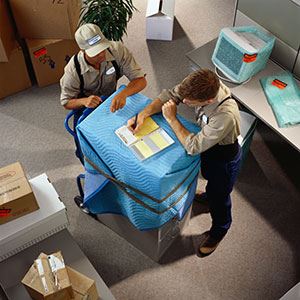 If you've been tasked with planning an office move it is a good idea for you to reach out to your local Commercial Relocation Network (CRN) member for advice. You can locate members at www.officemovingcrn.com and type in your zip code to find your local representative.
If you've been tasked with planning an office move it is a good idea for you to reach out to your local Commercial Relocation Network (CRN) member for advice. You can locate members at www.officemovingcrn.com and type in your zip code to find your local representative.
I'd like to share some of my own experiences dealing with customers who did not fully plan every aspect of the move logistics or allow us to assist in the full scope of the office moving plan.
- Create a move team within your own organization to meet and discuss the move with.Also, make sure that there is a clear “leader” (i.e. single point of contact) that is the final decision maker within your organization if any questions arise.
- When will your company have a full “Certificate of Occupancy” at the new space you have secured? Your entire move timeline and logistics is dependent upon this date/access.
- If your company is purchasing new furniture, when will the goods be delivered from the manufacturer? If your move timeline is shifted or derailed for any reason, what is your contingency plan for this furniture? Will you require storage? Does your move plan allow time for the new furniture to be installed before the move of your data, servers, contents, and computers? You don't want multiple companies trying to access entryways, elevators, or dock space at the same time.
- Have you established a relationship with a local mover for moving & storage services? If not, this would be a good place to start. It is smart to establish rates for moving & storage services in advance of your needs. This prevents any last minute negotiating and also provides you a resource/relationship that can assist you in planning or when you're in an office move coordinating pinch. Working with your local mover as early as possible in the planning phase may help you understand additional services the mover can provide you in the future.
- Ask for a key to lockout the elevator at both origin and destination facilities. Many elevators have this and it helps ensure you have access to the elevator during your office move.
- DO also ask for a phone number for an elevator service technician in case an elevator "trips out" during the move process. Having no elevator access can bring your office relocation to a halt.
- What is your plan for data back-up on your servers? Talk to your IT staff. If you don’t have an IT staff, there is a company called Virtual Move (as well as others) that will allow you put your information "in the cloud" with fully encrypted secure access. This will allow your employees to work during the move of server racks. Your company does not have to be inoperable during the move.
- Who will be your new data service provider? Make sure the service providers providing you phone and data are scheduled to have everything in place before your physical office move is to occur.
- Who is disconnecting your individual computer systems? Your employee or the moving company? Most moving companies offer computer disconnect & reconnect services as a very cost effective amenity to their service. This can also assist with proper preparation and planning since you don't want this to be misunderstood going into the process. It’s not advised to surprise your mover with PC disconnects on move day. This would be a potential disaster if the proper planning or team preparation is not in place by your mover.
- What type of boxes will you use to move? There are several styles of moving boxes that serve different needs. If you plan to pack, move, and unpack in a two week window I'd suggest you utilize plastic e-crates. These are ergonomic, reduce risk of injury, reduce waste (support Green Initiatives), and in my opinion reduce your overall move cost. I would only suggest utilizing corrugated boxes if there are items that need to be packed well in advance of the move, do not need to be unpacked well after the move is complete, or that you plan to store (such as records you need to keep for year). There are also computer moving crates. I don't suggest using these due to the space they take up. However, the do reduce handling required by the mover and also reduce risk of moving related damage.
- Have a pre-move meeting with your staff! Perhaps the single most important thing you can do is educate your staff about their responsibility during the move process. Discuss proper packing techniques, proper labeling, and where to find information they need such as their new office number.
- Assign personnel to pack common areas such as kitchens, reception areas, file rooms, storage rooms, etc. Get a head start in the weeks before your move by emptying your refrigerators.
These are just a few tips from lessons I've learned about office moving. As the premier service provider in my area and a member of the Commercial Relocation Network, I'm confident that if you address these office move planning tips it will greatly assist you with your upcoming relocation.
Brad Murphy
Vice President
Armstrong Relocation
Huntsville, AL
